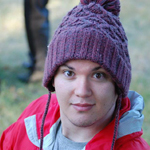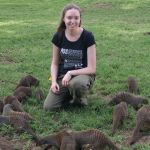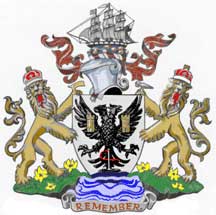
EMPSEB 19 is organised by 18 PhD students from the University of Exeter's Cornwall and Streatham Campuses.
Siobhan O'Brien - PresidentE-mail: president@empseb19.com | |
 | Representing the 'international' element of EMPSEB 19, Siobhan will be making the conference more tropical, exotic and colourful, everything that her homeland of Ireland is renowned for. While not eating potatoes, she enjoys pretending to resolve all of the fascinating questions social evolution has yet to answer. She uses various species of Pseudomonad bacteria to uncover why and when we are nice to each other, and why cooperation exists in nature when natural selection should select against it. In her spare time she can usually be found pretending to surf, drinking very fine wine, or making everyone's ears bleed by singing really loudly. |
Chris Beirne - Vice-PresidentE-mail: vicepres@empseb19.com | |
 | Chris chases badgers, young and old, to investigate the causes and consequences of individual variation in aging rates. During his spare time he runs and photographs his way around as much of Cornwall as possible. His research profile can be found here, and he tweets from @Chris_Beirne. |
Sheridan Willis - TreasurerE-mail: treasurer@empseb19.com | |
 | Sheridan first crossed the border from Devon into Cornwall to do a Masters in Evolutionary and Behavioural Ecology. As she loves the South West so much, she was over the moon to be offered a PhD at the Cornwall campus. Sheridan researches intra-locus sexual conflict in Indian meal moths. Although sexual dimorphism has evolved in these moths, there is still strong evidence for conflict over life-history traits. Sheridan will be looking at the mechanisms that may help overcome this conflict, such as sex-biased gene expression. When not in the lab or standing in a fridge, Sheridan can be found exploring Cornwall, going to see bands, enjoying a tipple of wine and succumbing to a rather unhealthy obsession with cheese. |
Beatrice Downing - SecretaryE-mail: secretary@empseb19.com | |
 | Bea studies social behaviour by chasing wild geese across southern England. She's interested in intraspecific variation, its causes, evolution, and effects at group, population and landscape scales. Her PhD project uses social network analysis to decipher patterns in social groups and links these to disease parameters. The ultimate aim is to elucidate disease transmission in a wild, heterogeneous population. When she's not being a scientist, Bea can be found on the coast paths or stuck halfway up a climbing route. |
Helen Leggett - TravelE-mail: travel@empseb19.com | |
 | Helen’s research focuses on social evolution and virulence in parasites by way of experimental evolution with various strains of bacteria and bacteriophages. Helen’s research profile can be found here. In her spare time, Helen likes running and endurance events, dog walking and baking. |
Lindsay Walker - Venue | |
 | For half the year, Lindsay lives in the beautiful Kalahari Desert, South Africa, chasing white browed sparrow weavers around the acacias. She is fascinated by apparent altruistic behaviours, investigating individual contributions to cooperative activities such as provisioning, sentineling and weaving, and aims to establish the mechanistic underpinning to such behaviours. Further details of Lindsay’s research can he found here. During free time in Kalahari she is an avid adventurist, embarking on activities such as walking with rhinos, bottle feeding orphan aardvarks, wrestling with honey badgers and rescuing people from giant aardvark holes. Cornwall side, you can find Lindsay bobbing around the sea or indulging in her love of rum. |
Sarah Paul - Public Engagement | |
 | Sarah studied her BSc at Cardiff University and then spent three years working on mammals. She has recently downsized to a less furry study species, the ladybird, and is in the first year of her PhD studying the fitness consequences of intraguild predation in 2-spot, 7-spot and harlequin ladybirds. When not in the lab she can usually be found outdoors in a kayak or a pair of running shoes. |
Matthew Silk - Events | |
 | A great love of spending nights in airport terminals and listening to music far too loudly on car stereos resulted in Matt choosing a career as a human GPS logger. Frequent trips to cold and wet places are used to study social network structure in a migratory population of light-bellied brent geese, hoping to explore the link between site use, sociality, behaviour, condition and success (see here or here for more info). When not pursuing geese you’re only really likely to find him on a sports pitch or somewhere in the Cornish countryside with a camera. |
Eoin Duffy - Plenary Speakers | |
 | Eoin is the second Irish person on our team and works with good old fashioned Drosophila. His focus is on the relationship between sexual and natural selection and examines how both evolutionary processes can complement and impede each other. Eoin is interested in questions like does sexual selection promote adaptation to a novel environment, can sexually antagonistic variation for fitness lead to intralocus sexual conflict in his study species Drosophila simulans, and does the latter change depending on a population’s evolutionary history? When not pooting flies Eoin plays bass guitar, listens to heavy metal and enjoys brushing his teeth with Guinness. |
Publicity TeamE-mail: publicity@empseb19.com Michael Hawkes | |
 | Michael is currently on a lab rotation in Exeter learning how to use modern bioinformatic techniques to perform comparative genomics with NGS data. When he returns to Cornwall, however, he will be researching the interplay between sex, selfish genes, and insecticide resistance in the fruit fly Drosophila melanogaster. When not catching flies mid-air with a pair of chopsticks or searching for missing semicolons in Perl scripts, Michael enjoys rambling, birding, photography, and real ale. You can find Michael's research profile here, and he tweets from @mfhawkes. |
Katy Scott | |
 | As a small child, Katy wanted her own zoo like Gerald Durrell. When, at the age of seven, it was explained to her that people didn't just start zoos any more, she decided instead to be a zoologist. While studying for her bachelor's degree at the University of Durham, she spent a year working at Paignton Zoo in Devon, and then continued that zoo-based research into her PhD at the University of Exeter's Cornwall Campus. She currently studies the behaviour and physiology of meerkats in zoos, and finds the differences between captive and wild animals fascinating. Katy also enjoys horse riding and skiing, and has an unhealthy obsession with the game of cricket. |
Emma Wood | |
 | Emma studies white-browed sparrow weavers in the Kalahari as part of a team trying to understand how and why these birds breed co-operatively. Her PhD focuses on how social environment affects ageing rates of both chicks and adults, and she is investigating age-related declines in performance and the roles that telomere dynamics and immunosenescence play in mediating such declines. She loves fieldwork and has previously worked with lions in South Africa, sea turtles in Cyprus and gannets in Ireland. In her spare time Emma paints, climbs, and occasionally attempts to surf. |
Fundraising TeamE-mail: fundraising@empseb19.com David Fisher | |
 | David began his studies at the University of Liverpool, where he completed a Masters studying polyandry in a monandrous species of fruit fly (about as much polyandry there as you would imagine). After this he moved to the University of Exeter's Cornwall campus to pursue his interest in how selection and evolution are played out in the wild. Currently he is using Social Network Analysis to investigate how a wild population of field crickets interact and what affect individual behaviours have on lifetime fitness and the population as a whole. This involves plenty of "watching tv" a.k.a video analysis, but one day he'd like to be released into the wild. Outside of the University David enjoys outdoor activities such as kayaking, walking and rugby, and involving beer in these whenever possible. |
Lucy Ovens | |
 | Lucy was in dire danger of becoming ‘that crazy badger woman’ during her master’s degree at the University of Exeter Cornwall Campus last year, and so finally decided to stop living in denial and fully embrace this title. Lucy is a first year PhD student studying the social networks of badgers, researching how social behaviour impacts disease dynamics. She is hoping to use this information to test the efficacy of alternative bovine tuberculosis control strategies. Her research profile can be found here. In her spare time, Lucy pretends to be a middle aged woman, who enjoys knitting, baking and sewing. |













